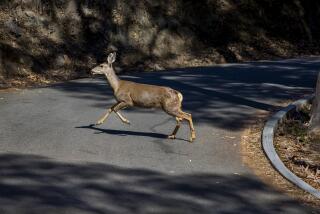Changing landscapes
- Share via
Lost in Alaska on a trail that’s littered with bear scat, John Hildebrand trips over what feels like a tree root, only to discover it’s the bleached skull of a moose, staring emptily back at him. “In that instance, the woods washed over me like a wave,” he writes. When he finally stumbles on the path out, Hildebrand resolves to be a better writer and father, then downs half a bottle of whiskey out of sheer relief.
This is just one of many tales of ambivalent redemption in “A Northern Front,” the essayist’s new collection. In pieces ranging 20 years, Hildebrand travels from Minnesota farmland to Arctic wilderness to Highway 1 in California, exploring the ways these places are changing.
Along the way, he’s mindful of the people whose lives are affected by development or social changes, like the Gwich’in in Alaska, who fear losing the sustenance of caribou to oil development, or the now-extinct hitchhikers who once dotted the roadsides along Highway 1.
The author also revisits his own losses, including a cabin in remote Alaska that he and his former wife built and then abandoned along with the ambition to live closer to the land.
Even the last duck of the hunting season that gets away -- a hen shot, but not yet dead -- represents all the remorse of intentions unfulfilled: “I’ve already consigned her to that long list of things done badly that no amount of wishing will undo,” he writes.
Certainly, these essays will not be added to that list. Often elegiac, but never patly nostalgic, Hildebrand’s prose exposes the shifting of emotional fault lines, as a farm becomes a subdivision or a wilderness cabin reverts back to the wild.
-- Katharine Mieszkowski
More to Read
Sign up for our Book Club newsletter
Get the latest news, events and more from the Los Angeles Times Book Club, and help us get L.A. reading and talking.
You may occasionally receive promotional content from the Los Angeles Times.










